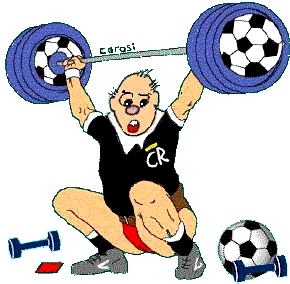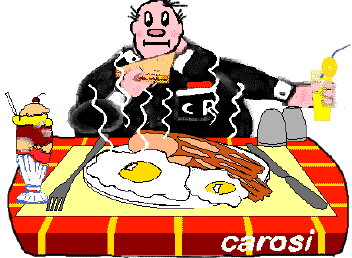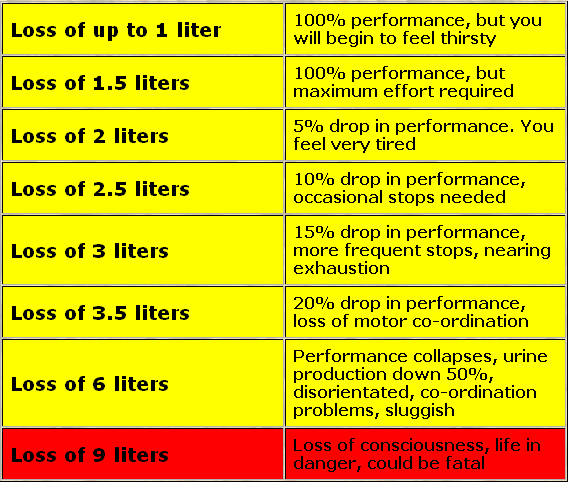| |
 |
FOOD & THE REFEREE…
Preparing and Training…
Andrew Castiglione
Founder of Ken Aston Referee Society
 |
EATING SENSIBLY
FUELLING UP
TAKING IN FLUID
CLIMBING THE PYRAMID
THE DAY BEFORE THE MATCH
MATCH DAY
WHAT TO DRINK DURING THE MATCH
WHAT TO EAT/DRINK AFTER THE MATCH |
 |
Referee Fitness - Body Mass Index Guide is HERE!!!
EATING SENSIBLY - General Advice for all Referees
As well as training regularly your everyday choice of food is going to
be a key factor in maintaining your target weight, and/or reducing the
percentage of body fat.
Thought - It is estimated you consume 5 to 8 times your body weight in
food in any one year - that is an average of over 450kg (1000 lb.) of
food, not counting the weight of what you drink.
Usually your body is very efficient and is able to sort through all this
mixture and extract what is needed to keep you functioning. It is not
just the quantity of food that is important but the right balance.
Fact - You need , which are the basic raw materials required to
build and repair the body. These would include proteins, fats,
carbohydrates, vitamins, minerals and water.
Fact - You need to fuel the body.
Fact - You need , found in natural plant substances, to aid the
passage of the food through your body.
If you are eating nearly half a ton of food each year, it is just about
impossible to go short of the basic nutrients. On average you eat about
twice as much protein as you actually need, and if you are eating a
varied diet with plenty of fresh fruit and vegetables, cereals and some
fish, eggs, meat and dairy products, you should also be getting
sufficient vitamins and minerals.
Advice - Unless there is a particular medical reason
for you to do so, your body does not need vitamin and mineral
supplements as an extra.
As a result of all the meat, dairy products and refined foods being
eaten today, the one real shortage area is likely to be that of dietary
fibre (roughage). This is part of the food we eat that is not digested
and as it passes through the body, it absorbs and retains water, making
the waste materials easier to move. Fiber is found in bread (especially
whole meal), cereals, potatoes, peas, beans, lentils, leafy vegetables
and fruit - all plant foods - and not in food that comes from animals.
Advice - Where you know you eat plenty of refined
foods, you should consider doubling the amount of fiber in your diet.
For those of you carrying a few extra pounds, you probably have too much
fat in your diet and would benefit by reducing your fat intake by at
least a quarter. This may seem like a major change in your eating
habits, but it is not as difficult to achieve as it sounds.
Tips - Follow these simple suggestions and your fat
intake will be reduced substantially...

 - Try fish or vegetable dishes instead of meat
- Try fish or vegetable dishes instead of meat
 - When you do have meat try and choose the leaner cut or cut off the
fatty bits
- When you do have meat try and choose the leaner cut or cut off the
fatty bits
 - Eat chicken, which has less fat than other meats
- Eat chicken, which has less fat than other meats
 - Have fewer fry-ups, consider grilling food instead Cut down on
chocolate
- Have fewer fry-ups, consider grilling food instead Cut down on
chocolate
 - Cut down on fatty cheeses
- Cut down on fatty cheeses
 - Use low-fat spreads and dairy products and spread butter or margarine
more thinly
- Use low-fat spreads and dairy products and spread butter or margarine
more thinly
 - Try semi-skimmed or skimmed milk
- Try semi-skimmed or skimmed milk
If losing weight is a priority it is quite safe to cut down on sugar.
Sugar has no nutritional value other than its energy content.
Fact - The average person in America / Britain eats
about 100 pounds of sugar per year.
Thought - That amount would provide you with enough
energy to walk from Manchester to Barcelona AND BACK.
The message is clear. Far too much sugar is being eaten.
The trouble is, sugar is a standard ingredient in a huge variety of
foods and in alcoholic drinks. Apart from the obvious foods like sweets,
jam, marmalade, cakes, biscuits and pastries, it can also be found in
the syrups of tinned fruits, in savory sauces and in many sweetened
drinks.
Tips - It is surprisingly easy to adjust to eating less
sugar...

 - Take less sugar in your tea or coffee. Gradually reduce the number of
spoonfuls to help you get used to the difference in taste
- Take less sugar in your tea or coffee. Gradually reduce the number of
spoonfuls to help you get used to the difference in taste
 - Choose diet or slim line drinks
- Choose diet or slim line drinks
 - Spread jam and marmalade more thinly
- Spread jam and marmalade more thinly
 - Cut down on sweets and chocolate
- Cut down on sweets and chocolate
 - Eat fewer biscuits
- Eat fewer biscuits
 - Eat smaller portions of cake
- Eat smaller portions of cake
 - Read what the labels say on food packets...
- Read what the labels say on food packets...

Eating sensibly will be of benefit to all referees and will go a long
way towards helping you achieve the right weight for your height. Being
the right weight is the singularly most important fitness factor for
referees operating within local football. That is why the first five
activities of your Fitness Awareness Profile concentrate on your weight
and fat content.
Advice - Revisit Activities 1-5 of your Fitness Awareness
Profile regularly.
FUELLING UP
The onset of fatigue coincides with a decrease in the quality of your
performance. However, fatigue can be delayed or reduced by correct
nutrition. In fact, eating the right foods really can make the
difference between being in the 'right place at the right time' or not.
The amount of energy you will need to referee will vary according to
your age, body weight (there it is again), how hard you work and at
which level you are refereeing.
Advice - FIFA recommends that you should obtain 60-70%
of your total energy intake from carbohydrates, 20-25% from fat, and
approximately 15% from protein.
Fact - When you eat any food containing carbohydrate,
your body into glycogen converts much of the carbohydrate, which is
stored in your liver and muscles. When you train or referee you need a
lot of energy quickly and the glycogen acts as the fuel to your muscles.
However, your stores of muscle glycogen are quite limited and only
sufficient for around 90 minutes of activity. Once the glycogen stores
are depleted, fatigue occurs quickly.
Tip - To delay the point of fatigue it is important to
start any training session or match with your fuel stores full of
glycogen. This is achieved by eating plenty of foods containing a lot of
carbohydrate.
Referee Fitness - Body Mass Index Guide is HERE!!!
Good Sources of Carbohydrates
Table 1:

Advice - For your main meal on the day, prior to a
match, eat a meal based on the foods above.
Tip - Up to 1 hour prior to a training session or a
match, top up your fuel supplies with a 'Carbohydrate Snack'. These
include:
Table 2:

Immediately following a training session or a match you need to start
refueling with carbohydrates as soon as possible. It is vital not to
wait too long before refueling, as your rate of recovery will be quicker
if you can refuel during the first few hours after training or a match.
Fact - Muscles take up glycogen and especially within
the first hour.
Muscles take up glycogen most rapidly within 2 hours after
exercise
Advice - Eat a 'Carbohydrate Snack' as soon as you can
following ANY training or a match, e.g. chocolate bar,
banana, sandwiches, biscuits etc. Eat a carbohydrate-based
meal within 2 hours of the game or training session.
Tip - Arrange to eat your main meal of the day after
training or a game.
TAKING IN FLUID
During training and in matches you will lose fluids, up to 1-2 liters
per hour in sweat. Dehydration will occur and will result in poor
physical performance. Even small fluid losses from the body can impair
the accuracy and skill of your performance, whilst larger losses can
affect temperature control, the cardiovascular system and become life
threatening as shown in the following Table 3.
Table 3:

Remember - Thirst is a poor indicator of hydration. If
you only drink when you feel thirsty, it is already too late as thirst
is the emergency signal that your body is already dehydrated.
Tip - 'Little and often' is the key to fluid intake.
Advice - Take plenty of fluids on the day of the game
and between 20-30 minutes prior to a match (or training), drink about a
half liter of cool water or a sports drink.
During training try to stay well hydrated. Choose drinks that are cool
and palatable and take in fluid about every 15 minutes throughout the
session more frequently if it is hot.
During a match, always have a drink at half time whether you
feel thirsty or not.
At the end of a training session or a match drink plenty of
fluid - at least 1 liter.
Warning - Alcohol should be avoided during the first
two hours after a training session or a match because it is a diuretic,
which causes water loss. Alcohol should only be consumed once the weight
lost from sweating has been replaced. The passing of clear urine is a
simple indicator of when dehydration has occurred.
CLIMBING THE PYRAMID
Progress in any sport invariably means participants having to pay
attention to the smallest detail if they wish to improve and compete
with the best. Improving as a referee and officiating at higher levels
brings with it certain expectations of the officials and any advantage
the referee can gain must be to his/her benefit. Every avenue must be
explored and 'fine tuning' your diet may just give you that extra edge.
The 'basics' already outlined are the same for all referees, but
progress brings higher physical demands and the need to maximize your
energy output. Ensuring your glycogen supplies are fully topped up prior
to entering the field of play may make the difference between completing
the game with energy to spare or fading badly in the last 15 minutes
with serious consequences.
Although you should be conscious of your diet every day, particular
attention should be paid to what you eat on the day prior to a match and
on match day.
THE DAY BEFORE THE MATCH
 - Eat a High Carbohydrate Breakfast, e.g. 1
bowl of cereal, 3-4 pieces of toast (with jam, marmalade or honey if you
wish), and 1 glass of fruit juice.
- Eat a High Carbohydrate Breakfast, e.g. 1
bowl of cereal, 3-4 pieces of toast (with jam, marmalade or honey if you
wish), and 1 glass of fruit juice.
 - It is important to drink more throughout the
day, (fruit juices, sports drinks etc.).
- It is important to drink more throughout the
day, (fruit juices, sports drinks etc.).
 - Eat 2-3 'Carbohydrate Snacks' during the
day.
- Eat 2-3 'Carbohydrate Snacks' during the
day.
 - For your main meal (evening) - eat a meal
based around high carbohydrate foods.
- For your main meal (evening) - eat a meal
based around high carbohydrate foods.
MATCH DAY
 - Eat a High Carbohydrate Breakfast as on the
previous day.
- Eat a High Carbohydrate Breakfast as on the
previous day.
 - For your Pre-Match Meal eat a carbohydrate
meal (approximately 100g of carbohydrate) 3-4 hours before kick-off.
(See Table 1 above - Food Portions Containing 50g of Carbohydrate)
- For your Pre-Match Meal eat a carbohydrate
meal (approximately 100g of carbohydrate) 3-4 hours before kick-off.
(See Table 1 above - Food Portions Containing 50g of Carbohydrate)
 - Continue eating 'Carbohydrate Snacks' up to
1 hour before the game.
- Continue eating 'Carbohydrate Snacks' up to
1 hour before the game.
 - Drink at least 3 liters of fluids throughout
the morning/early afternoon before the match.
- Drink at least 3 liters of fluids throughout
the morning/early afternoon before the match.
 - Drink approximately 0.5 liter of fluid 30
minutes before the match.
- Drink approximately 0.5 liter of fluid 30
minutes before the match.
WHAT TO DRINK DURING THE MATCH
 - Drink approximately 0.5 liter of fluid (sports drink) at half time.
- Drink approximately 0.5 liter of fluid (sports drink) at half time.
 - Take on fluids whenever possible during stoppages in the match.
- Take on fluids whenever possible during stoppages in the match.
WHAT TO EAT/DRINK AFTER THE MATCH
 - Drink at least 1 liter of fluid immediately after the match.
- Drink at least 1 liter of fluid immediately after the match.
 - Make sure you take at least 100g of carbohydrate during the first two
hours after the game. This can be easily done with a combination of
fluids and foods that are rich in carbohydrate.
- Make sure you take at least 100g of carbohydrate during the first two
hours after the game. This can be easily done with a combination of
fluids and foods that are rich in carbohydrate.
 - Do not drink any alcohol during the first two hours after a match.
- Do not drink any alcohol during the first two hours after a match.
Examples of Food Portions
Containing 509 of Carbohydrate

Source of information: 'A Guide to
Fitness for Referees' April 2001, produced by the Football Association
England. Acknowledgement to the National Coordinator for Fitness
Training, Vernon Crew; along with expert advice from John Brewer,
Director of the Lilleshall Sports Injury and Human Performance Center;
Alan Hodson, Director of the Football Association Medical Education
Center; and Rob Hartley, Head of the Sports Science Department,
University of Brighton.
|